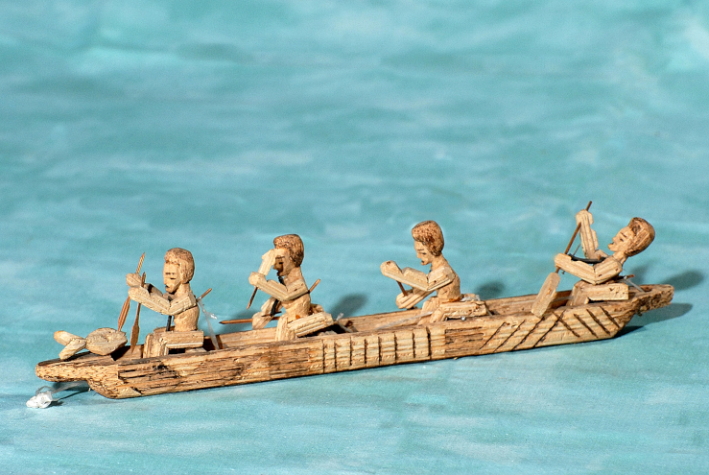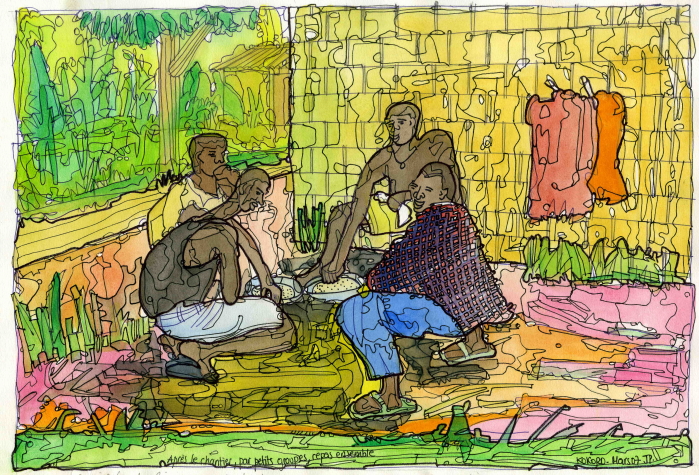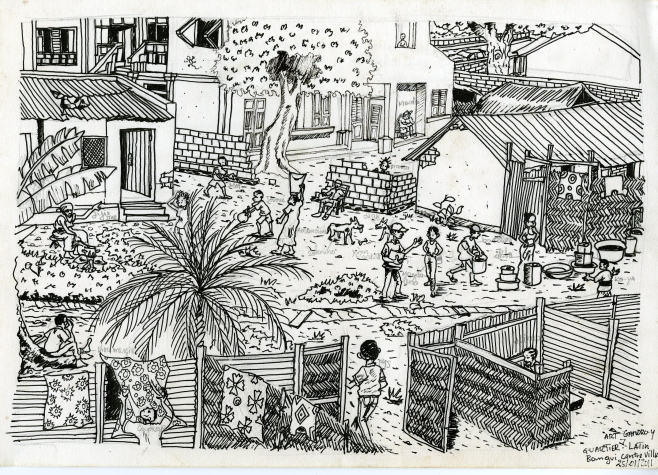Staying in Touch in Times of Crisis

Image above: Sculpture: 2012, Central African Republic, carved boat on water – AR0100101091 © ATD Quart Monde
The COVID-19 pandemic is primarily a health crisis. Today’s emergency is, of course, quite different from the 2013-2015 civil war in Central African Republic. Yet, as the article below illustrates, there is a common thread in how people cope with fear and uncertainty. Written by an ATD Volunteer Corps member based in CAR during the armed conflict, this account reminds us of people’s deep need to connect with others in any sort of crisis.
How do people endure such difficult times? Keeping in touch, hearing from family and friends, is one way of coping together. In these times of crisis, a significant part of our team’s work in Bangui consists in sustaining connections and sharing news.
Every day residents of Bangui find new ways to cope with this crisis. And the one which comes to people spontaneously is being in touch with others, getting updates from them, whether they are close by or far away. This is what gives people courage and joy, as well as the strength to keep believing that tomorrow will be a better day.

- “As long as we can get news, we can hold out”, says Bruno. “News from our family, from our home country and our friends, from here and elsewhere”. Clara adds, “Even though the situation in the neighbourhood is tough, we have to go outside to get the news”.
In one of Bangui’s largest camps for displaced people, an NGO provided a dozen radio sets. The spokesperson for the camp’s inhabitants emphasises that, “Without information, we find ourselves in disinformation”. He and others in the camp are thinking about setting up information points at regular times so people can listen to the news together on the radio.
- “The workplace is also a place to gather and talk with other people”, explains Gilbert. I go to work even though I haven’t been paid for the last six months. Every day when we get together, we support each other. Someone might say, ‘If things aren’t going well where you live, you can come stay with us’. It strengthens our connections. If someone lets you stay at their place, it means a lot. The children will remember that. Being informed is important, but so is having other people willing to help you out.”
Since the beginning of the trouble in Central African Republic a year ago, the ATD Fourth World “Courtyard” has become a beehive of activity. There, friends of ATD can find one another and share messages from all over the city, from farther villages, and even from around the world.
Divin is in touch by text message. “I was online with Peter from Switzerland. He sent greetings to all the friends here”. Or, “I talked to Francois in France and he says hello to everyone!” “Friends on the island, in the city center and in other camps send greetings – also Luçay, Guillermo, Elie and even Pape Diop in Senegal!”
The Courtyard welcomes ATD Fourth World members almost daily. They receive messages and immediately share news with other parts of the city. It’s a strategic location to maintain connections with friends from different areas. Messages arriving from Kassai get sent out to Kokoro, from Walingba to Fatima, or from the island of Mbongossoua to Gobongo, Miskine, Danzi, Koula Mandja, and then news travels back from those places too. No matter what the means of communication – conversations, little written notes, phone, internet or Skype calls with other countries – every day, the ATD team relays words of friendship and encouragement between people.
As Simplice wisely puts it,
“Sharing news between us, knowing that we’re there for each other, getting news from everyone we know: that’s a good start towards peace”.
All these connections and updates between people we know – that’s what keeps us alive and helps us cope. As so many of our members say, “We know that we are together and that many people wish us well, and that matters!”.


